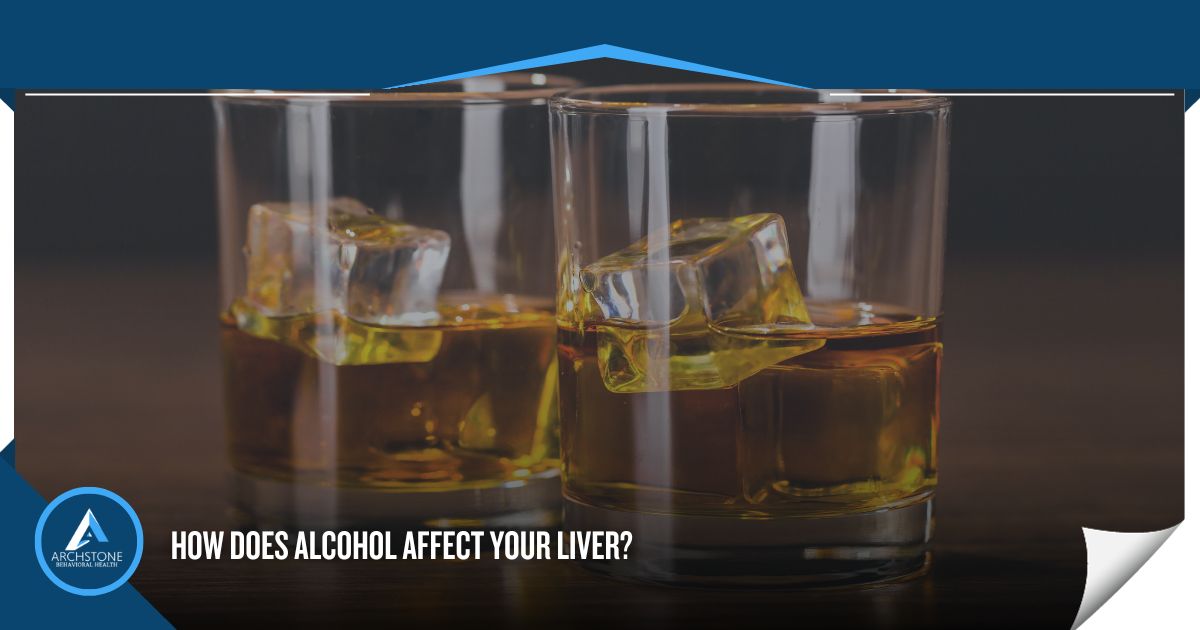How Does Alcohol Affect Your Liver?
Get Help Now

According to the National Institute of Alcohol Abuse or Alcoholism (NIAAA), 29.5 million people met the criteria for alcoholism in 2021.[1]
When someone abuses alcohol heavily or suffers from an alcohol use disorder, drinking will begin to impact their health. One of the biggest health risks associated with excessive alcohol consumption is liver disease. Alcohol abuse can lead to three different types of liver disease: steatosis, alcoholic hepatitis, and cirrhosis.
How Does Alcohol Damage Your Liver?
When you consume alcohol, your liver breaks it down so that it can be expelled from your body. Alcohol is turned into acetaldehyde once it’s in your liver, which is a highly toxic substance and a known carcinogen.[2] When you consume excess amounts of alcohol, this chemical can build up in your liver and damage your cells, leading to liver disease.
According to the NIAAA, “Of the 100,530 liver disease deaths among people ages 12 and older in 2021, 47.4% involved alcohol.”[3]
The types of liver disease that can develop after excessive alcohol intake include:
Fatty Liver Disease (Steatosis)
Fatty liver disease is the most common type of alcohol-related liver disease. This condition develops when alcohol has damaged your liver in a manner that causes fat to build up, causing the liver to not function properly.[4] Without treatment, fatty liver disease can lead to life-threatening complications and later-stage liver diseases.
Inflammation of the Liver (Alcoholic Hepatitis)
Between 20 to 40% of alcoholics with fatty liver disease will develop alcoholic hepatitis.[5] This disease is characterized by severe inflammation in the liver. At first, alcoholic hepatitis might not cause symptoms, making it difficult to determine that you require treatment.
The longer you go without treating alcoholic hepatitis, the worse it can get. The severe version of this disease is life-threatening and can cause the following symptoms:[5]
- Loss of appetite
- General feelings of sickness
- Stomach pain
- Yellow skin (jaundice)
- Liver failure
- Cirrhosis
Scarring of the Liver (Cirrhosis)
The last stage of alcohol-related liver disease is cirrhosis. The build-up of fat and inflammation in the liver can lead to scarring in the liver, which prevents healthy cells from being able to survive. Once someone has scarring of the liver, the damage may be irreversible and can lead to complete liver failure.
Studies show that up to 30% of people who consume more than 40 grams of alcohol a day long-term develop cirrhosis.[4]
The symptoms of cirrhosis include:[6]
- Feeling sick
- Vomiting blood
- Having a swollen stomach
- Loss of appetite
- Itching
- Muscle cramps
How to Tell if You Are Suffering From an Alcohol Use Disorder (AUD)
The best way to avoid developing liver disease is to quit drinking alcohol. Long-term and heavy consumption of alcohol will eventually lead to liver disease, which can be fatal without early medical intervention.
If you are worried that your drinking has gotten out of control, it is helpful to be aware of the signs of alcohol use disorder. The symptoms of alcoholism may include:[7]
- Drinking more or longer than you intended to
- Wanting to cut back or stop drinking but being unsuccessful
- Spending a lot of time drinking or recovering from the effects of alcohol
- Experiencing uncontrollable urges or cravings to drink alcohol
- Drinking interferes with taking care of your family, working, or attending school
- Continued to drink despite facing interpersonal and social issues
- Losing interest in previously enjoyed activities because of alcohol
- Getting into risky situations while drinking alcohol, such as driving under the influence
- Continuing to drink despite facing physical or mental health issues as a direct result
- Needing to drink more to experience the desired effect
- Experiencing withdrawal symptoms when you cannot drink alcohol
If you or a loved one deal with the above-mentioned signs of alcohol use disorder, it’s time to seek help. Receiving professional treatment for alcoholism can prevent you from developing life-threatening conditions like liver disease.
Finding Help for Alcohol Abuse and Alcoholism
If you or a loved one frequently abuses alcohol, you could be struggling with an addiction. Long-term abuse of alcohol can lead to a variety of health concerns, including fatal liver disease. As a result, you should always seek assistance from an alcohol rehab program.
To learn more about our alcoholism treatment program, contact Archstone Behavioral Health today.
References:
- The National Institute of Alcohol Abuse and Alcoholism (NIAAA): Alcohol Use Disorder (AUD) in the United States, Retrieved November 2023 From https://www.niaaa.nih.gov/alcohols-effects-health/alcohol-topics/alcohol-facts-and-statistics/alcohol-use-disorder-aud-united-states-age-groups-and-demographic-characteristics
- The National Institute of Alcohol Abuse and Alcoholism (NIAAA): Alcohol Metabolism, Retrieved November 2023 From https://www.niaaa.nih.gov/publications/alcohol-metabolism
- The National Institute of Alcohol Abuse and Alcoholism (NIAAA): Alcohol and the Human Body, Retrieved November 2023 From https://www.niaaa.nih.gov/alcohols-effects-health/alcohol-topics/alcohol-facts-and-statistics/alcohol-and-human-body
- The National Library of Medicine (NLM): Alcoholic Liver Disease, Retrieved November 2023 From https://www.ncbi.nlm.nih.gov/books/NBK546632/
- The National Library of Medicine (NLM): Alcoholic Hepatitis, Retrieved November 2023 From https://www.ncbi.nlm.nih.gov/books/NBK470217/
- The National Institutes of Health (NIH): Symptoms and Causes of Cirrhosis, Retrieved November 2023 From https://www.niddk.nih.gov/health-information/liver-disease/cirrhosis/symptoms-causes